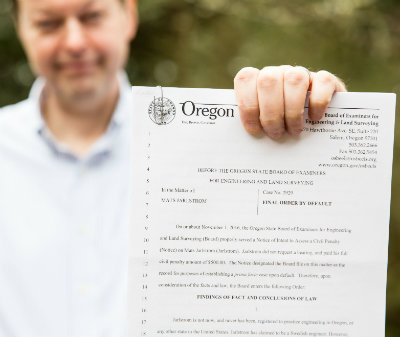After Challenging Red Light Cameras, Oregon Man Fined $500 for Practicing Engineering Without a License
"Anyone should be allowed to talk about the traffic signals without being penalized," says Mats Järlström. He's suing the board.

When Mats Järlström's wife got snagged by one of Oregon's red light cameras in 2013, he challenged the ticket by questioning the timing of the yellow lights at intersections where cameras had been installed.
Since then, his research into red light cameras has earned him attention in local and national media—in 2014, he presented his evidence on an episode of "60 Minutes"—and an invitation to present at last year's annual meeting of the Institute of Transportation Engineers.
It also got him a $500 fine from the Oregon State Board of Examiners for Engineering and Land Surveying.
According to the board, Järlström's research into red light cameras and their effectiveness amounts to practicing engineering without a license. No, really. Järlström had sent a letter to the board in 2014 asking for the opportunity to present his research on how too-short yellow lights were making money for the state by putting the public's safety at risk. "I would like to present these fact for your review and comment," he wrote.
Instead of inviting him to present, the board threatened him. Citing state laws that make it illegal to practice engineering without a license, the board told Järlström that even calling himself an "electronics engineer" and the use of the phrase "I am an engineer" in his letter were enough to "create violations."
Apparently the threats weren't enough, because the board follow-up in January of this year by officially fining Järlström $500 for the supposed crime of "practicing engineering without being registered."
Järlström is now suing the state board over that fine, arguing that it's unconstitutional to prevent someone from doing math without the government's permission. He's getting support from the Institute for Justice, a national libertarian law firm.
"Criticizing the government's engineering isn't a crime; it's a constitutional right," said Sam Gedge, an attorney at the Institute for Justice, in a statement. "Under the First Amendment, you don't need to be a licensed lawyer to write an article critical of a Supreme Court decision, you don't need to be a licensed landscape architect to create a gardening blog, and you don't need to be a licensed engineer to talk about traffic lights."
The notion that it's somehow illegal for Järlström to call himself an engineer is absurd. He has a degree in electrical engineering from Sweden, worked as an airplane camera mechanic in the Swedish Air Force, and has worked in a variety of technical jobs since immigrating to the United States in 1992. In Oregon, though, all that matters is whether he has a state-issued license.
As crazy as Järlström's story is, it's not the first time the Oregon State Board of Examiners for Engineering and Land Surveying has been overly aggressive about enforcing their rules for who is and who is not an engineer.
According to the lawsuit, the state board investigated Portland City Commissioner Dan Saltzman in 2014 for publishing a campaign pamphlet that mentioned Saltzman's background as an "environmental engineer." Saltzman has a bachelor's degree in environmental and civil engineering from Cornell University, a master's degree from MIT's School of Civil Engineering, and is a membership of the American Society of Civil Engineers.
What he isn't, though, is a licensed engineer in the state of Oregon.
According to Järlström's lawsuit, the board spent more than a year investigating Saltzman's background before voting to issue an official "warning" against using the word engineer incorrectly.
In another case, the state board investigated a Republican gubernatorial candidate for using the phrase "I'm an engineer and a problem-solver" in a campaign ad. The candidate in question, Allen Alley, had a degree in engineering from Purdue University and worked as an engineer for Boeing (and, of course, wasn't trying to lie about his lack of an Oregon-issued licensed but merely was making a freaking campaign ad), but
It doesn't stop there. In 2010, the state board issued a $1,000 fine for illegally practicing engineering to a local activist who told the La Pine, Oregon, city council that a proposed new power plant would be too loud for nearby residents.
The board once investigated Portland Monthly magazine for running a story that described a young immigrant woman as "an engineer behind Portland's newest bridge." The woman in the story did not describe herself as an engineer, but the magazine's editors included that description in the headline, the board concluded.
Järlström's lawsuit isn't seeking any monetary damages. He only wants a judicial order telling the state state board to stop violating the free speech rights of Oregonians.
"Anyone should be allowed to talk about the traffic signals—if they're too long or too short or anything—without being penalized," Järlström says.


Show Comments (176)